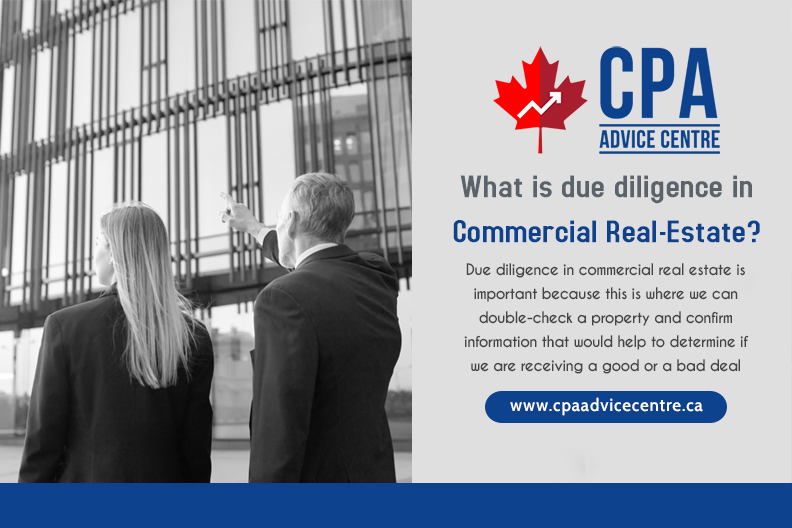Real estate is a rising industry in Ontario, and we should be extra careful about the properties that we are trying to buy. When a property is offered to us for sale, we should be asking the experts about their take on whether we should buy it or not. This is where due diligence comes into place, and it is helping us to determine if the property offered to us is worth our money. Due diligence in commercial real estate is important because this is where we can check and double-check a property and confirm information that would help us to determine if we are receiving a good or a bad deal.

Due diligence in commercial real estate can be divided into four major parts – physical inspection, financial investigation, legal inquiries, and environment inspection.
PHYSICAL INSPECTION
It is important to conduct a physical inspection of the property that is being offered to us. Through physical inspection, we can determine if the figure being asked for the property is worth it, and we can also check if there are things that should be improved. When it comes to physical inspection, we need to hire a professional inspector who will be roaming around the property, looking for things that should be pointed out. Physical inspection can last for a whole day, and we need to stay with the property inspector that we hired so they can give us a timely update about the condition of the property. Without a physical inspection, it would be difficult for us to determine the condition of the property. We might be paying a higher amount for the property even if the features inside does not deserve a higher price tag. When we seek the assistance from professional physical inspectors, they will be giving us with a list of items that they noticed inside the property, and the most considerable amount that we can provide the agent selling the property. Hiring an inspector for the property will help us save a lot of money while at the same time, getting the best deals available in the market.FINANCIAL INVESTIGATION
Hiring an accountant that has years of experience handling real estate investments would help you establish due diligence in commercial real estate. Filter the applicants to find the best one for the position. The reason why you need to choose the best is that real estate investments should be handled by a professional for you to get the best deals. If you are having issues when choosing the right accountant for your real estate investments, you can always ask your friends, commercial real estate agent, or business broker and ask them about their preferences regarding the position. They can suggest someone whom they have worked with and has a lot of experience in handling these transactions.LEGAL INQUIRIES
Lastly, seek assistance from legal professionals when handling real estate investments. They will help you with the legal side of due diligence, and they will look for various considerations. A legal professional will require you to present the title and the survey of the property, and they will be searching for any defects that will lead to a lower property value on your end. Lastly, the encroachments and uses that are either proper or improper must be checked by the lawyers to make sure that it would not affect the value of the property directly. When these considerations are left untouched, it can result in failed deals. Before you choose the lawyer, who will be helping you with your due diligence concerns, make sure to create a checklist on how you will be choosing the legal professional who will represent you. It would be difficult to work with a lawyer who does not have any background in commercial real estate, so be sure to check where they have worked in the past. You can also call your friends, commercial real estate agent or business broker and seek their guidance regarding this matter.ENVIRONMENT INSPECTION
Phase 1 and 2 inspections are also required to give the buyer an insight into the status of the soil and groundwater. There are chances that the soil and/or groundwater in the area is already spoiled or contaminated, and it would have a huge impact on the value of the property. Phase I inspection assesses that a certain property is contaminated using visual observations, regulatory records, and historical use reviews. Phase II inspections, on the other hand, assesses whether contamination is present. Phase 3 includes both the planning and the execution of a remediation of an impacted site.DUE DILIGENCE CHECKLIST
Due diligence is one of the most critical stages of acquiring any commercial real estate properties. You always wanted to review all of the documents handed to you and search for any red flags that would make you change your mind. There are a lot of considerations as well before you sign the deal. The following information will guide individuals who wanted to buy commercial real estate, and the due diligence checklist will help them determine whether it is worth it to purchase the property.- The first thing that you need to look for is the title of the property. Make sure that it is the most recent title, and information such as the name of the owner and the previous person who owned the property is included in the paper. You also need to ask for all of the related documents that can help you review the property that you are trying to buy. All of the required documents must be under the possession of the current owner.
- The property should also have a recent land survey and a topographic study. You also need to ask the seller about the property’s construction blueprint, as-built drawings, and engineering plans. These documents are usually kept by the owner of the property, and they should provide these documents ready to the person who has an interest in purchasing the property.
- Another document that should be handed over by the property seller would be the legal description of the commercial real estate property. This document contains all of the details about the property, which has been supervised by a legal professional.
- A zoning compliance certificate might also be required from the property seller if you decide to purchase their property. The zoning compliance certificate showcases the zoning approvals that have been granted to the property.
- Conditions, covenants, easements, reservations, and restrictions for the property should also be declared, and the property seller must present you with the documents that will support this claim.
- Engineering and environmental reports that were generated for the property should also be handed over. Some examples of this report are the following: soil and underground water tests, foundation reports, appraisals, termite studies, and radon studies, among others. Without these reports, you would never find out if the building is structurally safe. You should also ask the seller for phase 1 and phase 2 reports.
- You also need to obtain a true and complete copy of a written lease provided by the seller, and the guarantees that come with it. Make sure that the seller would also provide you with a certification stating that there are no oral understandings or oral leases that have been provided to other individuals.
- Ask for detailed accounting information that covers all of the rent and income generated by the property. This document should also disclose the maintenance expenses of the building, the security deposits, tax contributions, and other payments that were made to maintain the property under the best conditions.
- The seller should also provide you with a copy of the real estate tax bills paid within the last three years. Special assessments and incentives that were provided should also be included in the document that will be handed to your, along with the tax protests and all related correspondence that can support this claim.
- A certified true and complete copy of the service contract and oral-service contract that has been used to completely maintain the property should also be provided by the property seller. This will give you peace of mind knowing that the building is going under regular maintenance and all of the utilities inside are maintained. Some of the most common problems encountered by those who purchase a brand-new commercial property would be the lack of utilities such as running water, which can have a detrimental effect on running the business.
- Tax statements and collection reports that have been generated for the past three years should also be included in the list of documents that should be presented by the property seller.
- You also need to get the list of all the chattels, fixtures and equipment owned by the seller that is located within the commercial real estate that you wanted to buy.
- Ask them for the complete list of permits that have been awarded by the local government.
- Ask for any pending litigation to make you aware of the things that you need to do when the schedule comes.
- Ask the seller to provide you with the signed copies of all leases coming from the exiting tenants, and have your solicitor run through it.
- Check if the HVAC unit and the electrical system within the building needs any major repairs, or if there is a pending repair order.
- Verify the rental deposit summary of the seller through their bank deposit if they have multiple tenants.
- The property should be free of local improvement charges, so clarify it with the local government.
- Get the complete list of tenants and ask for their address, email, and contact number.
- Make sure that the seller is HST registrant, under the Canadian excise act.
- The seller should provide the estoppel certificate to the buyer before the closing date comes. It would certify that all of the information provided is correct. It also serves as proof that the lease exists, and there are no rent defaults and rent paid on a given date.
- Lastly, ask for other supporting documents that might satisfy your need to confirm that all of the documents handed to you are authentic. You can ask your attorney about this matter and they will guide you on which documents are still needed. This will be helpful especially when you run into legal problems after purchasing the property.







